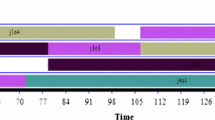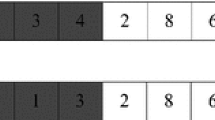Abstract
Stochastic flow shop scheduling is a typical and widely studied NP-hard stochastic optimisation problem with strong industrial roots. However, due to inaccurate estimation of objective values, NP-hardness and a limited computing budget, it is generally hard to solve such stochastic optimisation problems effectively and efficiently. Based on the idea of order comparison and goal softening, ordinal optimisation (OO) has been widely applied for stochastic optimisation. In this paper, OO and optimal computing budget allocation (OCBA) as well as a genetic algorithm (GA) are reasonably hybridised to propose an effective genetic ordinal optimisation (GOO) approach for flow shop scheduling with stochastic processing times. In GOO, limited computing effort can be intelligently allocated by OCBA to provide reliable and robust evaluation and identification of good solutions in a population, and the solution space can be well explored by an order-based evolutionary genetic search with the good solutions identified by OCBA. Simulation results based on benchmarks demonstrate the effectiveness of the GOO by comparison with traditional methods. Moreover, the effects of some parameters on the optimisation performance are discussed.
Similar content being viewed by others
References
Gourgand M, Grangeon N, Norre S (2003) A contribution to the stochastic flow shop scheduling problem. Eur J Oper Res 151:415–433
Wang L, Zhang L, Zheng DZ (2003) A class of order-based genetic algorithm for flow shop scheduling. Int J Adv Manuf Tech 22:828–835
Garey MR, Johnson DS (1979) Computers and intractability: a guide to the theory of NP-completeness. Freeman, San Francisco
Baker KR (1974) Introduction to sequencing and scheduling. Wiley, New York
Nawaz M, Enscore E Jr, Ham I (1983) A heuristic algorithm for the m-machine, n-job flow-shop sequencing problem. Omega 11(1):91–95
Koulamas C (1998) A new constructive heuristic for the flowshop scheduling problem. Eur J Oper Res 105:66–71
Ogbu FA, Smith DK (1990) The application of the simulated annealing algorithm to the solution of the n/m/Cmax flowshop problem. Comput Oper Res 17(3):243–253
Osman IH, Potts CN (1989) Simulated annealing for permutation flow-shop scheduling. Omega 17(6):551–557
Reeves CR (1995) A genetic algorithm for flowshop sequencing. Comput Oper Res 22(1):5–13
Nowicki E, Smutnicki C (1996) A fast tabu search algorithm for the permutation flow-shop problem. Eur J Oper Res 91:160–175
Wang L, Zheng DZ (2003) A modified evolutionary programming for flow shop scheduling. Int J Adv Manuf Tech 22(7-8):522–527
Dimopoulos C, Zalzala AMS (2000) Recent development in evolutionary computation for manufacturing optimization: problems, solutions, and comparisons. IEEE Trans Evol Comput 4(2):93–113
Pinedo M (1995) Scheduling theory, algorithms, and systems. Prentice-Hall, New York
Kamburowski J (2000) On three-machine flow shops with random job processing times. Eur J Oper Res 125:440–449
De P, Ghosh JB, Wells CE (1992) Expectation-variance analysis of job sequences under processing time uncertainty. Int J Prod Econ 28:289–297
Honkomp SJ, Mockus L, Reklaitis GV (1999) A framework for schedule evaluation with processing uncertainty. Comput Chem Eng 23(4-5):595–609
Wang L, Zhang L, Zheng DZ (2005) A class of hypothesis-test based genetic algorithm for flow shop scheduling with stochastic processing time. Int J Adv Manuf Tech (in press)
Balasubramanian J, Grossmann IE (2002) A novel branch and bound algorithm for scheduling flowshop plants with uncertain processing times. Comput Chem Eng 26(1):41–57
Gutjahr WJ, Hellmayr A, Pflug GC (1999) Optimal stochastic single-machine-tardiness scheduling by stochastic branch-and-bound. Eur J Oper Res 117(2):396–413
Luh PB, Chen D, Thakur LS (1999) An effective approach for job-shop scheduling with uncertain processing requirements. IEEE Trans Robo Automat 15(2):328–339
Kouvelis P, Daniels RL, Vairaktarakis G (2000) Robust scheduling of a two-machine flow shop with uncertain processing times. IIE Trans 32(5):421–432
Tsujimura Y, Park SH, Chang IS, Gen M (1993) An effective method for solving flow shop scheduling problems with fuzzy processing times. Comput Ind Eng 25:239–242
Michalwicz Z (1996) Genetic algorithms + data structures = evolution programs, 3rd edition. Springer, Berlin Heidelberg New York
Ho YC, Sreenivas R, Vakili P (1992) Ordinal optimization of discrete event dynamic systems. Discret Event Dyn Syst 2(2):61–88
Chen CH, Lin J, Yucesan E, Chick SE (2000) Simulation budget allocation for further enhancing the efficiency of ordinal optimization. Discret Event Dyn Syst 10:251–270
Dai L (1996) Convergence properties of ordinal comparison in the simulation of discrete event dynamic systems. J Optim Theory Appl 91(2):363–388
Lee LH, Lau TWE, Ho YC (1999) Explanation of goal softening in ordinal optimization. IEEE Trans Automatic Control 44(1):94–99
Wang L, Zheng DZ (2003) An effective hybrid heuristic for flow shop scheduling. Int J Adv Manuf Tech 21(1):38–44
Croce FD, Tadei R, Volta G (1995) A genetic algorithm for the job shop problem. Comput Oper Res 22(1):15–24
Carlier J (1978) Ordonnancements a contraintes disjonctives. R.A.I.R.O. Recherche operationelle/Oper Res 12:333–351
Author information
Authors and Affiliations
Corresponding author
Rights and permissions
About this article
Cite this article
Wang, L., Zhang, L. & Zheng, DZ. Genetic ordinal optimisation for stochastic flow shop scheduling. Int J Adv Manuf Technol 27, 166–173 (2005). https://doi.org/10.1007/s00170-004-2154-z
Received:
Accepted:
Published:
Issue Date:
DOI: https://doi.org/10.1007/s00170-004-2154-z




